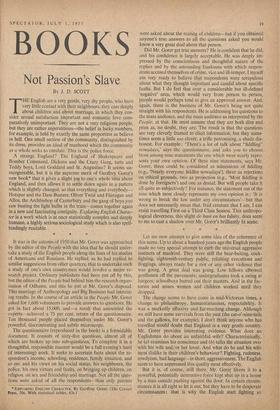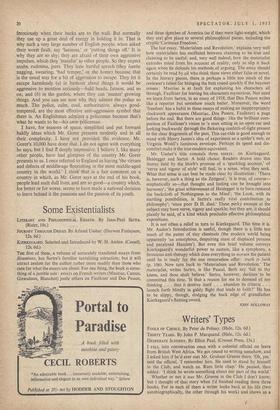BOOKS
Not Passion's Slave
BY J. D. SCOTT THE English are a very gentle, very shy people, who have very little contact with their neighbours; they care deeply about children and about marriage, in which they con- sider sexual satisfaction important and romantic love com- paratively unimportant. They are not a very religious people, but they are rather superstitious—the belief in lucky numbers, for example, is held by exactly the same proportion as believe in hell. One small section of the community, distinguished by its dress, provides an ideal of manhood which the community as a whole seeks to emulate. This is the police force. , A strange England'? The England of Shakespeare and Bomber Command, Dickens and the Crazy Gang, tarts and Teddy boys, Lord Goddard and St. Augustine? It seems un- recognisable, but it is the supreme merit of Geoffrey Gorer's new book* that it gives a slight jog to one's whole idea about England, and then allows it to settle down again in a pattern which is slightly changed, so that everything and everybody— Hotspur and the Dam Busters, Oliver Twist and Flanagan and Allen, the Archbishop of Canterbury and the gang of boys you saw busting the light bulbs in the train—comes together again in a new and fascinating contiguity. Exploring English Charac- ter is a work which is at once statistically complex and deeply humane, a highly serious sociological study which is also spell- bindingly readable.
* * * It was in the autumn of 1950 that Mr. Gorer was approached by the editor of the People with the idea that he should under- take a study of the English people along the lines of his studies of Americans and Russians. He replied, as he had replied to similar suggestions from other quarters, that to undertake such a study of one's own countrymen would involve -a major re- search project. Ordinary publishers had been put off by this, but the editor of the People had behind him the research organ- isation of Odhams, and this he put at Mr. Gorer's disposal. This marriage of Anthropology and Big Business had interest- ing results. In the course of an article in the People Mr. Gorer asked for 1,600 volunteers to prOvide answers to questions. He got in fact about 15,000, and—a result that astounded the experts—achieved a 75 per cent. return of the questionnaire. Ten thousand people placed themselves under Mr. Gorer's powerful, discriminating and subtle microscope. The questionnaire (reproduced in the book) is .a formidable document. It consists of sixty-five questionS, almost all of which are broken up into sub-questions. To complete it in a thoughtful, responsible manner would be a full evening's hard (if interesting) work. It seeks to ascertain facts about the re- spondent's income, schooling, residence, family situation, and so on; and his views on his social status, his neighbours, the police, his own virtues and faults, on bringing up children, on religion, on sex and friendship and marriage. Not all the ques- tions were asked of all the respondents—thus only parents * EXPLORING ENGLISH CHARACTER. By Geoffrey Gorer. (The Cresset Press, 30s. With statistical tables, 63s.) were asked about the rearing of children—but if you obtained anyone's true answers to all the questions asked you would know a very great deal about that person.
Did Mr. Gorer get true answers? He is confident that he did. and his confidence is largely acceptable. He was deeply im- pressed by the conscientious and thoughtful nature of the replies and by the astounding frankness with which respon- dents accused themselves of crime, vice and ill-temper. I myself am very ready to believe that respondents were scrupulous about what they thought important and candid about specific faults. But I do feel that over a considerable but ill-defined 'negative' area, which would vary from person to person, people would perhaps tend to give an approved answer. And, again, there is the business of Mr. Gorer's being not quite straight with his respondents. He is addressing his questions to the mass audience, and the mass audience as interpreted by the People, at that. He must assume that they are both dim and prim as, no doubt, they are. The result is that the questions are very cleverly framed to elicit information, but they some- times seem a little too clever, a trifle patronising, a shade dis- honest. For example: 'There's a lot of talk about "fiddling" nowadays,' says the questionnaire, and asks you to choose from among nine statements the one which most nearly repre- sents your own opinion. Of these nine statements, says Mr. Gorer, three could be considered as admissions of fiddling (e.g., 'Nearly everyone fiddles nowadays'), three as rejections on ethical grounds, two as projectiOn (e.g., 'Most fiddling is done by foreigners') and one as denial. But will people take it all quite so subjectively? For instance, the statement out of the nine which most closely represents my own opinion is: 'It is wrong to break the law under any circumstances'—but that does not necessarily mean that, frail creature that I am, I can resist travelling First on a Third Class Season. This anthropo- logical cleverness, this slight de haut en bas falsity, does seem to me to cast a shadow over Mr. Gorer's brilliantly lit scene.
* * * Let me now attempt to give some idea of the coherence of this scene. Up to about a hundred years ago the English people made no very special attempt to curb the universal aggressive instincts of mankind. They were still the bear-baiting, cock- fighting, eighteenth-century public, relishing executions and floggings, always ready for a riot or any other violence that was going. A groat deal was going. Low fellows elbowed gentlemen off the pavements; undergraduates took a swing at bargees; schoolboys barred out their masters. And in the fac- tories and mines women and children worked until they dropped.
The change seems to have conic in mid-Victorian times, a change to philanthropy, humanitarianism, respectability. It was a markedly effective and far-reaching change. Although we still have some survivals from the past (the cat-o'-nine-tails and the gallows, for example), I don't think anyone who has travelled would doubt that England is a very gentle country. Mr. Gorer provides interesting evidence. What does an Englishman do about an unfaithful wife? Characteristically, he (a) examines his conscience and (h) talks the situation over with his wife and /or her lover. And what do he and his wife most dislike in their children's behaviour? Fighting, rudeness, rowdyism, bad language—in short, aggressiveness. The English seem to have suppressed this quality most effectively.
But it is, of course, still there. Mr. Gorer likens it to a powerful, potentially destructive force kept shut up in a house by a man outside pushing against the door. In certain circum- stances it is all right to let it out, but they have to be desperate circumstances : that is why the English start fighting so ferociously when their backs are to the wall. But normally they use up a great deal of energy in holding it in. That is why such a very large number of English people, when asked their worst fault, say 'laziness,' or 'putting things off.' It is .why they are so shy; they are afraid of their own aggressive impulses, which they 'transfer' to other people. So they expect snubs, rudeness, jeers. They hate hurtful speech (they loathe nagging, swearing, tad temper,' in the home) because that is the usual way for a bit of aggression to escape. They let it escape harmlessly (a) in humour about things it would be aggressive to mention seriously—bald heads, fatness, and so on; and (b) in the garden, where they can 'master' growing things. And you can see now why they admire the police so much. The police, calm, cool, authoritative, always good- tempered, are the most effective anti-aggression symbol that there is. An Englishman admires a policeman because that's what he wants to be—his own policeman.
I have, for reasons of space, simplified and put forward baldly ideas which Mr.. Gorer presents modestly and in all their complexity. I have not provided the evidence. Mr. Gorer's 10,000 have done that. I do not agree with everything he says, but I find it deeply impressive. I believe I, like many other pdople, have had glimpses of the country Mr. Gorer presents to us. I once referred to England as having 'the virtues and defects of middlerage flourishing in the most middle-aged country in the world.' I think that is a fair comment on a country in which, as Mr. Gorer says at the end of his book, people lead such dull lives, and are so good—a country which, for better or for worse, seems to have made a national decision to leave behind it the passions and the passion of its youth.















































 Previous page
Previous page